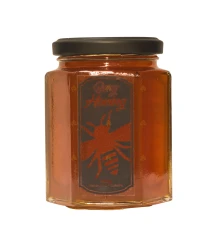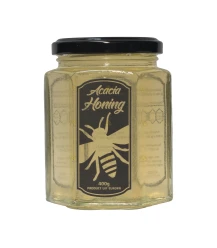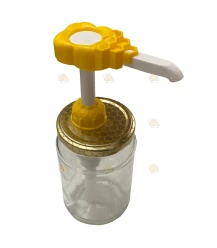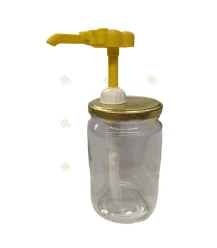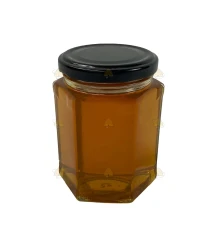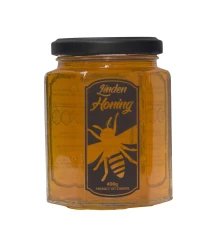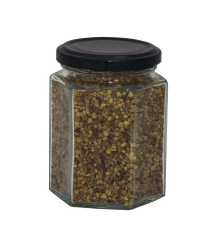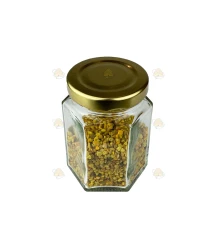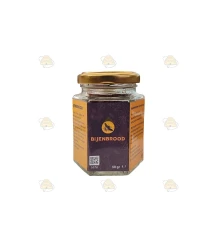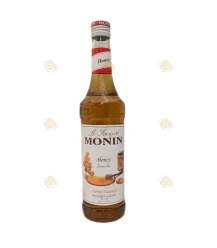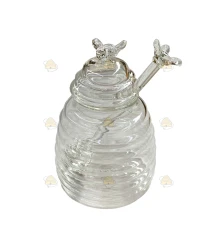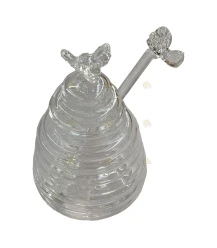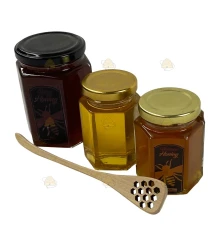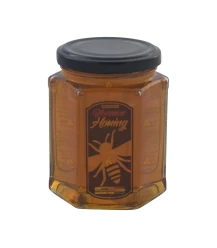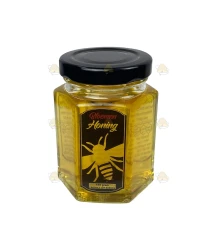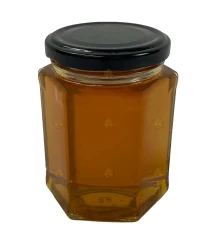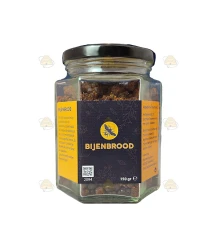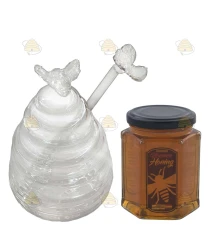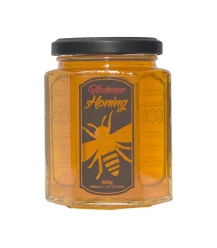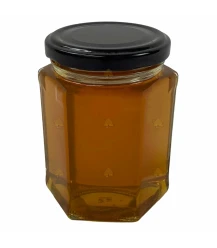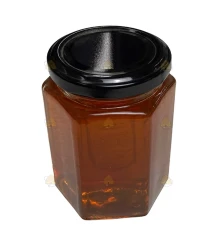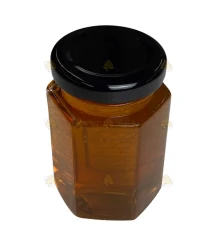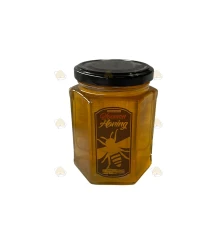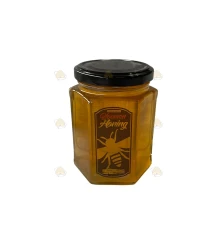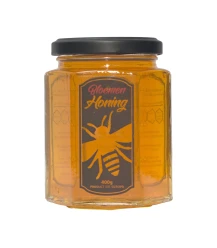Honey
Buying honey online seems easy. But how do you know you’re getting real honey that comes straight from the apiary and isn’t processed in a factory? We can tell you more and share tips. Our honey always comes directly from beekeepers and is not processed or extremely filtered. Honey in supermarkets is often filtered to prevent crystallization. After all, when honey has crystallized, some people stop buying it because they think it’s no longer good. By filtering it heavily and removing all the tiny particles from the honey, such as pollen that are actually very healthy, the honey crystallizes more slowly and also keeps looking nice when it sits on supermarket shelves for a long time. We always source our honey directly from the beekeeper. That way you get real, fresh honey, often from small, sustainable apiaries and beekeeping operations. Want to read more? Then scroll down this page, or go ahead and buy one of our delicious honeys!
-
Mountain Honey 350 g
€ 7,95 In stock and available for immediate delivery.Jar of delicious mountain honey. This mountain honey has a fresh taste with a hint of eucalyptus and/or mint. A delicious honey with an unexpected flavor. Be pleasantly surprised by this honey. One jar contains 400 g of mountain honey. This honey is jarred by the beekeeper; origin: Southeast Europe.View more -
Acacia honey 350 g
€ 8,95 In stock and available for immediate delivery.Jar of delicious acacia honey. Acacia honey is one of the few types of honey that almost never crystallizes. It’s a beautifully light, very runny honey. The flavour is very sweet. A delicious honey with a relatively neutral flavour. Let this honey surprise you—guaranteed different from supermarket honey. One jar contains 350 g of acacia honey. Packed by...View more -
Honey dispenser pump for honey jar (63 mm)
€ 5,10 In stock and available for immediate delivery.Honey dispensing pump with lid for a honey jar with a 63 mm lid size. With this dispensing pump you can easily pump honey from your jar. The lid fits our glass jars: 450 g and 350 g round, and 350 g hexagonal. You can cut the plastic extension tube to length yourself. Note: supplied without honey jar.View more -
Acacia honey 140 g
€ 5,25 In stock and available for immediate delivery.A jar of delicious acacia honey. Acacia honey is one of the few honeys that almost never crystallizes. It’s a light honey that stays liquid. The taste is pleasantly sweet—a delicious honey with a relatively neutral flavor. Let yourself be surprised by this honey, guaranteed different from supermarket honey. One jar contains 140 grams of acacia honey....View more -
Honey jar pump (82 mm)
€ 5,95 In StockHoney dispensing pump with lid for a honey jar with 82 mm lid size. With this dispensing pump you can easily pump honey from your honey jar. The lid fits our glass [product id=6198]750 g honey jars[/product] with 82 mm lid size. The plastic extension tube can be cut to size if the tube is too long. Note: supplied without honey jar.View more -
Rapeseed Honey 140 g
€ 4,50 This product is ordered, delivery time is approximately 21 days.140 g jar of rapeseed honey. Rapeseed honey is a light-colored honey with a neutral, mild flavor and is produced from the nectar of rapeseed flowers. This neutral honey is delicious spread on bread, and can also be used in salads or for cooking. It is best stored at room temperature. This honey is produced in Europe. Note: this is a light honey and can...View more -
Linden honey 350 grams
€ 6,95 Out of stockOut of stockA jar of delicious linden honey. This linden honey has a lovely full, neutral flavor. The flavor of linden honey can vary widely by harvest. This honey is ideal for everyday use. A delicious honey with a relatively neutral flavor. Let yourself be surprised by this honey—guaranteed different from supermarket honey. One jar contains 350 g of linden honey....View more -
Pollen (European) 160 grams
€ 7,65 In stock and available for immediate delivery.Jar with 160 grams of pollen. Bees collect pollen from flowers; they add enzymes and a little nectar and form pellets that they stick to their hind legs for transport; these pellets are called pollen. Bees collect pollen as a protein source. This pollen is about 35% protein. Besides protein they also contain, carbohydrates, fats and many minerals...View more -
Pollen (European) 50 grams
€ 3,25 In stock and available for immediate delivery.Jar with 50 g bee pollen. Bees collect pollen from flowers, add enzymes and some nectar, and form pellets that they stick to their hind legs for transport; these pellets are called bee pollen. Bees collect pollen as a protein source. This bee pollen is about 35% protein. Besides protein, it also contains carbohydrates, fats, and many minerals (potassium,...View more -
Bee bread 50 grams
€ 9,95 In stock and available for immediate delivery.Jar with 50 g of bee bread. Bee bread is a stored form of pollen in the beehive. The bees pack the pollen into the honeycomb and mix it with droplets of nectar. This forms hexagonal pellets that become slightly acidic and are thus preserved by the bees. Bee bread is packed with vitamins and is a good source of protein. It also contains carbohydrates, fats...View more -
Honey syrup 70 cl
€ 14,20 In StockA bottle of delicious Monin honey syrup with a signature floral honey flavor. This syrup is perfect for mixing with tea, coffee drinks, lemonades and cocktails, and it also dissolves in cold water. It is specially formulated to dissolve instantly in both hot and cold drinks. Contents: 70 cl syrup.View more -
Large glass honey jar
€ 13,55 In stock and available for immediate delivery.Clear glass jar with a sturdy glass honey dipper for serving honey. The jar is shaped like a beehive with a bee on the lid. The jar holds about 500 g of honey. This honey jar is approximately 15 cm tall and 9.5 cm wide. The honey jar consists of: Honey dipper with a little bee at the tip Lid with a bee on top Glass jarView more -
Small Glass Honey Jar
€ 10,25 In stock and available for immediate delivery.Clear glass jar with a sturdy glass honey dipper inside for serving honey. The jar is shaped like a beehive, with a bee on the lid. The jar holds about 250 g of honey. This honey jar is approximately 11 cm tall and 7.5 cm wide. The honey jar includes: Honey dipper with a bee at the tip Lid with a bee on top Glass jarView more -
Honey tasting pack
€ 16,99 Out of stockOut of stockDo you love honey, but not sure which flavor you like best? Then this bundle is perfect for you! This bundle contains three different types of honey: two jars of 140 g each, one jar of 350 g, and of course a lovely honey dipper! Contents of this bundle: [product id=4289]Mountain honey 140 g (#6882)[/product] [product id=1407]Acacia honey 350 g...View more -
Mountain honey 140 g
€ 4,75 In stock and available for immediate delivery.Delicious mountain honey (140 grams). This mountain honey has a fresh taste with a hint of eucalyptus and/or mint. A delightful honey with a surprising flavor. Be pleasantly surprised by this honey. A jar of honey contains 140 grams of mountain honey. This honey is packaged by the beekeeper, origin Southeast Europe.View more -
Zeeland autumn blossom honey 350 g (NL)
€ 8,95 Out of stockOut of stockA jar of delicious local Zeeland blossom honey. This blossom honey has a neutral flavor and is light in color. Be surprised by this honey—guaranteed different from supermarket honey. One jar contains 350 g of blossom honey. Packed by the beekeeper, origin: the Netherlands.View more -
Zeeland autumn blossom honey 140 grams (NL)
€ 4,90 Out of stockOut of stockJar of delicious local Zeeland blossom honey. This blossom honey has a mild, neutral flavor and is light in color. Be surprised by this honey, guaranteed different from supermarket honey. One jar contains 140 grams of blossom honey. This honey is packed by the beekeeper, origin Netherlands.View more -
Rapeseed honey 350 grams
€ 6,95 Out of stockOut of stockJar of rapeseed honey, 350 g. Rapeseed honey is a light-coloured honey with a neutral, mild flavour, produced from the nectar of rapeseed (oilseed rape) blossoms. This neutral honey is delicious as a spread on bread, and also works well in salads or cooking. For best results, store this honey at room temperature. This honey is harvested in Europe....View more -
Blossom honey 140 g
€ 4,90 In stock and available for immediate delivery.Jar of delicious wildflower honey. This wildflower honey has an aromatic, mild flavor. Discover the difference—this honey is nothing like supermarket honey. Each jar contains 140 g of wildflower honey. Packed by the beekeeper; sourced from the forests of Southeast Europe.View more -
Bee bread 150 g
€ 26,95 In stock and available for immediate delivery.150 g jar of bee bread. Bee bread is a stored form of pollen in the beehive. The bees pack the pollen into the honeycomb and mix it with drops of nectar. This forms hexagonal pellets that lightly acidify and are thereby preserved by the bees. Bee bread is packed with vitamins and is a good source of protein. It also contains, carbohydrates, fats and many...View more -
Small glass honey jar and 350 g honey
€ 16,50 This product is ordered, delivery time is approximately 14 days.Package consisting of:* [product id=2267] a small glass honey jar [/product] and* [product id=1500] 350 g delicious Zeeland autumn blossom honey [/product].A lovely package to treat yourself or someone else. The honey in this package is Zeeland, Brabant or Dutch blossom honey.View more -
Blossom honey 350 grams
€ 7,65 Out of stockOut of stockJar of delicious blossom honey. This blossom honey has an aromatic, neutral flavor. Be surprised by this honey—guaranteed different from supermarket honey. One jar contains 400 g of blossom honey. This honey is jarred by the beekeeper, origin Southeast Europe.View more -
Himalayan Balsam Honey 350 grams
€ 8,75 Out of stockOut of stockHimalayan balsam honey is a delicious light honey with a pleasant aroma. It remains liquid for a long time. This 350 g jar of Himalayan balsam honey is perfect on bread, in tea, and for other culinary uses.View more -
Sunflower Honey 350 g
€ 6,55 Out of stockOut of stockJar of sunflower honey (crystallized) with a net weight of 350 g. Sunflower honey is a popular sweet honey with a mild flavor. This neutral honey is delicious as a spread on bread, but can also be used in salads or for cooking. For best results, store this honey at room temperature. This honey is harvested in Europe. Note: This honey is...View more -
Sunflower Honey 140 g
€ 4,95 Out of stockOut of stock140 g jar of sunflower honey. Sunflower honey is a popular, sweet honey with a mild flavor. This mild, neutral honey is delicious spread on bread, and can also be used in salads or in cooking. For best results, store this honey at room temperature. This honey is harvested in Europe. Note: this is a light honey and may crystallize fairly quickly. This is a...View more -
Summer blossom honey 350 grams (NL)
€ 7,65 Out of stockOut of stockJar of delicious Dutch blossom honey. This honey has an aromatic, mild flavor. Be pleasantly surprised by this honey, guaranteed different from supermarket blossom honey. Each jar contains 350 g of blossom honey. This honey is packed by the beekeeper; origin: the Netherlands.View more -
Zeeland Summer Blossom Honey 350 g (NL)
€ 8,95 Out of stockOut of stockJar of delicious local Zeeland blossom honey. This blossom honey has a robust, neutral flavor. Be surprised by this honey, guaranteed different from supermarket honey. One jar contains 350 g of blossom honey. This honey is packed by the beekeeper, origin: the Netherlands.View more -
Spring willow blossom honey 350 g (NL)
€ 6,95 Out of stockOut of stockSpring blossom honey, mainly from willow. Willow is one of the first plants to provide forage for bees. This blossom honey has a subtly aromatic, neutral flavor. Be pleasantly surprised by this honey—guaranteed different from supermarket honey. Each jar contains 350 g of spring blossom honey. Packed by the beekeeper, origin: the Netherlands.View more
What types of honey are there?
Strictly speaking, there’s only one kind of honey, and that’s blossom honey. And yet that’s not entirely true. Keep reading and we’ll explain why. Blossom honey is often subdivided into many other varieties. A small selection of common types: acacia honey, rapeseed honey, mountain honey, Himalayan balsam honey, and clover honey. But there’s another small distinction. When people talk about forest honey or pine honey, this can be a honey gathered by bees from aphids. How does this work? Aphids excrete plant sap (honeydew), a sweet substance that bees lick or suck up from the aphids. They take it back to the colony and it eventually becomes honey. This is therefore not nectar from a flower collected by the honey bee itself, but honeydew from tree sap. And so it’s not actually blossom honey. It may still be called honey. Incidentally, Dutch organic honey is very hard to find, especially within the Netherlands. That’s because in the Netherlands there’s a lot of pollution from roads that run alongside nature reserves. There are rules that beehives must always be 5 km from the road. And that’s almost impossible in the Netherlands. The beekeeper must also use a different way of beekeeping. This makes it a bit more difficult, but it’s quite doable. A local beekeeper can tell you why they do or do not have organic honey.
Honey direct from the beekeeper!
Honey direct from the beekeeper is essentially fresh honey, also called raw honey. It is 100% natural. Sometimes people talk about cold‑extracted or warm‑extracted honey, but in practice honey is almost always cold‑extracted. That’s because honey straight from the hive is already a little warm from the bees themselves. After removing the combs from the hive, the honey is usually spun right away and, after extraction, stored in a tank briefly to settle. The jars are then filled. You can then say the honey is unprocessed. Naturally, the beekeeper may filter the honey once more, but that’s very different from filtering under high pressure and heating, as happens in a large processing plant. A beekeeper’s filters are comparatively coarse, so many beneficial traces remain in the honey. Looking at what’s in honey, we’re talking about vitamins, minerals, and natural sugars.
The crystallization of honey
Honey crystallizes naturally. This is a natural process and can be somewhat accelerated by tiny particles, such as pollen, present in the honey. These are very healthy to eat and contain various minerals, proteins, and vitamins. If the honey has crystallized, you can warm it to a maximum of 45°C. This ensures the honey doesn’t lose quality and retains all its properties. If you heat honey above 45°C, especially for a longer time, the quality deteriorates quickly. You can warm honey to 45°C by placing the jar in 45°C warm water or in an oven at 45°C for a short time. It will then become liquid again and easy to use. You can of course eat crystallized honey as well; it just tastes different due to its changed texture. Avoid using the microwave, to prevent the natural enzymes in honey from being destroyed.
Where can I buy honey?
Your best bet is to buy honey locally or from a specialist shop. Locally, you can often buy from a beekeeper with a sign at the door, or you can buy from us, at a store specialized in honey. Then you know you’re getting quality honey at a fair price. The taste of honey depends on the region it comes from. Every region has its own flavor. As long as the honey comes from Europe, you can still speak of ‘local,’ bearing in mind that many supermarkets source honey from South America or even China, where quality is sometimes lower because the honey has spent a long time in drums during transport and storage, sometimes even in the heat.
Health benefits of honey
Honey has been known for its unique health benefits for centuries. This natural sweetener, derived directly from the nectar of flowers and trees, is not only a delicious addition to our diet, but also offers numerous health benefits. Honey is an excellent source of natural energy. The unique combination of natural sugars such as glucose and fructose provides a quick energy boost. This makes honey an ideal snack for athletes or a quick pick‑me‑up during the day. Furthermore, honey is known for other properties, although I’m not giving scientific advice here due to claims. Below I’ll give an idea of what is said about honey and its supposed health properties.
Antioxidants: Raw honey is packed with important antioxidants, including organic acids and phenolic compounds such as flavonoids. Antioxidants help combat free radicals in the body, which can contribute to reducing the risk of chronic diseases such as heart disease and cancer.
Digestive support: Honey can promote digestion. It has prebiotic properties, meaning it stimulates the growth of good bacteria in the gut. This can help improve overall digestion and reduce issues such as bloating and constipation.
Natural cough suppressant: Honey is often used as a natural remedy for coughs. Its thicker consistency helps soothe the throat and reduce irritation. Studies have shown that honey can be as effective as some commercial cough suppressants. But we also sell propolis, another product from the beehive. This will work even better against coughs and is also available as a cough syrup.
Antibacterial and antifungal properties: Honey has natural antibacterial and antifungal properties. This is largely due to the presence of hydrogen peroxide and its high acidity. These properties make honey useful not only for wound healing, but also for fighting infections.
Skincare: Thanks to its anti‑inflammatory and antibacterial properties, honey is also a popular ingredient in natural skincare products. It can help with skin conditions such as acne and eczema and contributes to a healthy, radiant complexion.
Relief from seasonal allergies: Some people find relief from seasonal allergies by consuming local honey. The idea is that by consuming honey containing local pollen, the body can get used to these allergens, which may reduce hay fever symptoms. To achieve this there is another option as well: eat a tiny amount of pollen regularly. It’s best to start a few months before allergy season begins and symptoms appear.
It’s important to remember that while honey offers many health benefits, it’s still a sugar‑rich substance. Moderate consumption is therefore essential, especially for people who need to watch their sugar intake.
How should I store honey?
Store honey in a glass jar with a tight‑fitting lid. This prevents the honey from attracting moisture. Honey is hygroscopic, which means it absorbs moisture, and you don’t want that. It should stay as dry as possible to preserve its shelf life and to avoid absorbing off‑odors, for example from the kitchen. For the same reason, because it should not be heated, it also shouldn’t be kept warm; so preferably store honey cool in a cupboard, out of direct sunlight. But don’t put honey in the fridge, because it can crystallize faster. Honey does not spoil easily and can remain good for years, provided it is stored correctly. The taste and quality are best preserved if you follow these tips.

